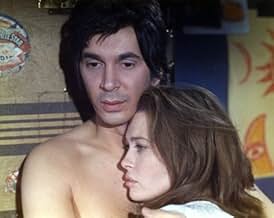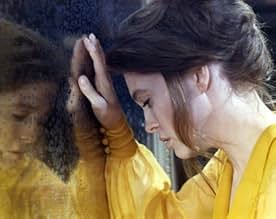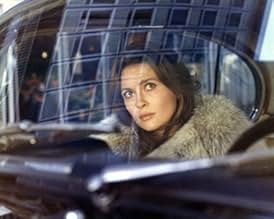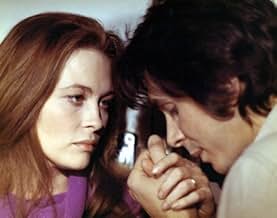La maison sous les arbres
- 1971
- Tous publics
- 1h 36m
IMDb RATING
5.6/10
693
YOUR RATING
Jill's husband has been distant and troubled since they moved to Paris. He is pressured at work to engage in illegal activities but he refuses. Soon after, when their children disappear whil... Read allJill's husband has been distant and troubled since they moved to Paris. He is pressured at work to engage in illegal activities but he refuses. Soon after, when their children disappear while in Jill's care, her mental health is questioned.Jill's husband has been distant and troubled since they moved to Paris. He is pressured at work to engage in illegal activities but he refuses. Soon after, when their children disappear while in Jill's care, her mental health is questioned.
Michele Lourie
- Cathy
- (as Michèle Lourie)
Michel Charrel
- Petit rôle
- (uncredited)
Featured reviews
Of all the misguided choices Faye Dunaway made in her film career after co-starring in the 1967 hit "Bonnie and Clyde", this French-Italian co-production from director René Clément may be the most perplexing. An adaptation of Arthur Cavanaugh's novel "The Children Are Gone", this kidnapping drama set in Paris looks mournfully chic in gauzy autumnal colors but rarely comes together. Bickering American couple from Laurel Canyon--now apartment-dwellers in Paris for the past two years while the husband writes a book--are thrown into turmoil when their two kids disappear while on an outing in the wife's care. Dunaway is supposed to be something of a dotty, unreliable flibbertigibbet, a child-woman acting out her whims who needs psychiatric help. It's a faintly ridiculous role, too much and yet not enough for any actress to make sense out of. The villains (who are strong-arming the husband into some nefarious doings) are ill-defined nasties who arrive on the scene to portentous music on the soundtrack (in the old days, the man would have had a mustache to twirl at one end). Released under a different title in just about every country it played--including France, where it was shown as "La maison sous les arbres" ("The House Under the Trees")--it's a film that goes nowhere...and takes its time going nowhere. *1/2 from ****
Atmospheric thriller / drama directed by René Clément, based on the novel "The Children Are Gone" by Arthur Cavanaugh, French produced and set in Paris with two major American stars, Faye Dunaway & Frank Langella plus the Canadian Barbara Parkins, it tells a story of Phillipe & Jill, an American couple with 2 kids, living in "the City of Light" for two years facing a marital crisis due to Phillipe's ultimately strange behavior & Jill's psychological problems. When their 8 years old daughter, Cathy & 4 years old son, Patrick are apparently kidnapped, Jill starts to uncover what's behind the mysteriously disappearance that might be related to her taciturn husband, Phillipe...
Slow paced & dreary, but effective on the thrills, "The Deadly Trap" (original title: "La Maison sous les arbres") keeps the viewer guessing, even if the end result was not that exciting and a bit too predictable. Some major editing errors, the low budget & a "made for TV" look to it, prevented the movie to became a cult classic of the genre like the moody & similar paced, "Don't Look Now" directed by Nicolas Roeg that was released about 2 years later, but it had its moments of skillful direction and nice shots of a gloomy Paris during winter time.
Faye Dunaway is very good in the lead role, from a devoted spouse & caring mother to a desperate woman fighting against her own psychological problems to remain lucid enough to find her children. Miss Dunaway's committed performance is a stand-out in the movie, elevating the final product to a "released to theaters" quality. A thirty-something Frank Langella, here some years before his iconic role in "Dracula", delivers one of his first experiences handling a quirky, odd, but somewhat darkly charming character, a kind of role he would be typecast for almost his entire career.
In short, "The Deadly Trap" isn't for everyone, but for fans of low-key psychological thrillers, the 70's & especially, the actress Faye Dunaway, it worth a watch.
Slow paced & dreary, but effective on the thrills, "The Deadly Trap" (original title: "La Maison sous les arbres") keeps the viewer guessing, even if the end result was not that exciting and a bit too predictable. Some major editing errors, the low budget & a "made for TV" look to it, prevented the movie to became a cult classic of the genre like the moody & similar paced, "Don't Look Now" directed by Nicolas Roeg that was released about 2 years later, but it had its moments of skillful direction and nice shots of a gloomy Paris during winter time.
Faye Dunaway is very good in the lead role, from a devoted spouse & caring mother to a desperate woman fighting against her own psychological problems to remain lucid enough to find her children. Miss Dunaway's committed performance is a stand-out in the movie, elevating the final product to a "released to theaters" quality. A thirty-something Frank Langella, here some years before his iconic role in "Dracula", delivers one of his first experiences handling a quirky, odd, but somewhat darkly charming character, a kind of role he would be typecast for almost his entire career.
In short, "The Deadly Trap" isn't for everyone, but for fans of low-key psychological thrillers, the 70's & especially, the actress Faye Dunaway, it worth a watch.
It should be said from the outset that the title Death Scream is not really very appropriate in describing this film. It's a much more low-key thriller than that pulpy title suggests. It was directed by the French film-maker René Clément, who had made a name for himself with Purple Noon (1960). It seems that the success with that film – the first screen version of Patricia Highsmith's character Ripley – led him to be called the French Hitchcock and resulted in him making a series of thrillers from then up until his final film in 1975. It seems the critics weren't very kind about his latter films, an opinion I disagree with. His final film Wanted: Babysitter (1975) is a very under-rated and effective film, while Death Scream is another that can hardly be described as terrible either. In fairness, it's the least successful Clément film I have seen but it still has something to offer.
It's an English language French movie starring Faye Dunaway and Frank Langella. They play an American married couple living in Paris. They are in the midst of martial problems; he is highly secretive, while she is going through a nervous breakdown. To complicate matters, Langella is an industrial spy who retires from his job to the annoyance of his paymasters. Meanwhile, Dunaway's fragile psychological temperament leads to various problems, culminating with the couple's children mysteriously disappearing while out with her in the city. All the time in the background, there is talk of an enigmatic group called 'the organisation' who threatens the family.
It's not the most dynamic of thrillers in truth and it is a little slow-paced. It could also have ramped up the suspense a bit as well. But Dunaway and Langella are good actors and the Parisian setting does offer an attractive backdrop to events. The story has just enough intrigue to keep the viewer engaged and it ultimately amounts to a good enough film, if a relatively minor one.
It's an English language French movie starring Faye Dunaway and Frank Langella. They play an American married couple living in Paris. They are in the midst of martial problems; he is highly secretive, while she is going through a nervous breakdown. To complicate matters, Langella is an industrial spy who retires from his job to the annoyance of his paymasters. Meanwhile, Dunaway's fragile psychological temperament leads to various problems, culminating with the couple's children mysteriously disappearing while out with her in the city. All the time in the background, there is talk of an enigmatic group called 'the organisation' who threatens the family.
It's not the most dynamic of thrillers in truth and it is a little slow-paced. It could also have ramped up the suspense a bit as well. But Dunaway and Langella are good actors and the Parisian setting does offer an attractive backdrop to events. The story has just enough intrigue to keep the viewer engaged and it ultimately amounts to a good enough film, if a relatively minor one.
From 1959 onwards (and with the success of "purple noon" (Ripley's first version),Clement wanted to become the French Hitchcock.He followed the rules quite well with the follow-up "les félins" then everything went wrong.After casting Jane Fonda ("les félins") he hired American stars for every "thriller" he made:Bronson,Ryan,Vaughn and here Dunaway.Why American stars by the way?They were all dubbed (with the exception of Fonda)for everybody cannot be Jodie Foster for that matter.
"La maison sous les arbres" is a would be suspenseful movie with heavy pretensions:a big set-up,where poor Dunaway is caught like a fly in a cobweb :her children are kidnapped and "they "keep them in... (well,check the title;it means "the house under the trees") No cigar ,and not even close.
"La maison sous les arbres" is a would be suspenseful movie with heavy pretensions:a big set-up,where poor Dunaway is caught like a fly in a cobweb :her children are kidnapped and "they "keep them in... (well,check the title;it means "the house under the trees") No cigar ,and not even close.
This gem may require a bit more patience than your average thriller, but its charms are plentiful and more often subtle than not. Director René Clément (1913-96) delivers an entrancing melodrama, highlighted by the ever-beautiful Faye Dunaway, who gives a tremendous performance as a mother in peril. Indeed, it's hard to imagine a better presentation of such a classic (or cliched) trope: Dunaway mixes her caught-in-the-middle Evelyn of "Chinatown" (1974) with the plucky Kathy of "Three Days of the Condor" (1975). It's unusual to see the actor portrayed as a loving mother (one exception being the great 1988 film "Burning Secret"), but her scenes with young Patrick are very believable (at the expense of so many other scenes - especially those with the enigmatic daughter Cathy). Even that little apartment the family occupies is very realistic too. They move around the place like they really live there.
Clément shows us a beautiful, but decidedly un-touristy side of Paris. The film, shot by Andréas Winding, who lensed Clément's previous "Rider on the Rain" (1970) and Jacques Tati's "Playtime" (1967), looks beautiful: soft focuses throughout, with Faye looking lovely, fading into dark, hazy, almost hallucinogenic settings. It's unclear why Faye and family are in Paris in the first place, but these outsiders inhabit their giallo with all the baggage that comes with strangers in a strange place. This film never quite goes giallo - despite its Italian title - but it comes close. The elliptical script was written by the actor/writer Daniel Boulanger (a writer of two segments of the 1967 Edgar Allan Poe omnibus film "Spirits of the Dead"), with the apparently uncredited Ring Lardner, Jr., who had previously scripted Robert Altman's "M.A.S.H." (1970) and was probably responsible for the convincing English dialog heard here (his credits in film noir are especially notable here).
It is a classic Hitchcockian situation, where a MacGuffin (in this case, a vague threat of "industrial espionage") drives the action. That action, the kidnapping of the children - which the script threatens mercilessly before the film's halfway point, when the kids finally disappear - comes, of course, from Hitchcock's "The Man Who Knew Too Much" (1956). But it's hard to see Faye Dunaway as a Hitchcock "blonde" or any one of the Master's female leads (only Marnie comes close). She comes from a generation of women Hitchcock could probably not have realistically directed or, really, even properly understood.
There are, however, a number of other film classics are referenced here as well, most notably "Gaslight" (1940 and 1944) and "Rosemary's Baby" (1968). These two references alone make Phillipe (a sexy Frank Langella) suspect; however, they also go to great length to address the painful wrongs society does to women in general and mothers in particular. The jolt, watching the film nearly five decades later, is seeing Jill (Faye Dunaway) taking the moral, public and even legal blame for the disappearance of her children. Once the kids are gone, Jill enters a Kafka nightmare that this film evokes in Wellesian images from the fantastic 1963 film adaptation of "The Trial."
The "brilliant" Phillipe's confusing involvement with "The Organization" also recalls Patricia Highsmith's "Ripley's Game," which is odd as that novel wasn't written for another three years (Wim Wenders filmed the 1974 book as "The American Friend" in 1977 and Liliana Cavani filmed it, beautifully again, in 2002). It's notable that Highsmith's first novel, "Strangers on a Train," was filmed by Hitchcock in 1951 while the novelist's celebrated "The Talented Mr. Ripley" was first filmed by Clément in 1960 as "Plein Soleil" (a.k.a. "Purple Noon" - also with Maurice Ronet, who gets only one brief scene here). It's not inconceivable that the talented Ms. Highsmith was inspired by this film to craft her terrific (and more logically worked out) "Ripley's Game."
The sheer number of beautiful staircases Clément shoots here also suggests the classic woman-in-peril noir "The Spiral Staircase" (1946): Jill's loving mother is "muted" here by her pre-figured criminality and her gaslighted "weak and imperfect" motherhood makes her an absolutely perfect potential victim. She can neither satisfy her husband (!) nor successfully protect her children. Well, it is early 70s French provincial after all. One staircase in particular here actually prefigures another famous staircase seen two years later in William Friedkin's "The Exorcist."
The lush orchestral score is by the renowned French singer Gilbert Bécaud (1927-2001), best known today as the writer of "What Now My Love" (covered by both Elvis Presley and Frank Sinatra) and "Let it Be Me" and co-writer of Neil Diamond's "Love on the Rocks" and "September Morn." Bécaud's main theme is a melodic piece that traffics appropriately in both playful childlike wistfulness and melancholy adult malaise. The tension cue that plays over the children's abduction is an eerie Morricone-esque minimalist piece that perfectly reflects a mind on the brink.
As far as the English dub on the 2016 Golem Video DVD I watched, the voices are so badly recorded it sounds as though they were doing it in someone's kitchen or bathroom. At times I couldn't figure out if Ms. Dunaway was dubbing herself or someone else was - or both. And all of the male voices sounded like no one other than Gene Wilder, who made a name for himself as Willy Wonka the year this film was released.
Oddly, this movie is known under many titles, few of which make much sense. Only the source novel's boring title seems reasonable, "The Children Are Gone." Not exactly thrilling, though, is it? So, how about the American title, "The Deadly Trap?" What was the trap? Phillipe's unexplained web of whatever? The French title, "The House by the Trees," sounds exciting - but it only makes sense toward the very end and only for a few brief moments. Then there's the Italian title, "The only clue: a yellow scarf," which is, umm, true but not as exciting as something like "The Amazon with the Scarf of Fire" or something baroquely giallo like that.
Still, the film is a worthy and intoxicating European thriller. It follows a classic dream/nightmare logic that makes it a worthy contender among such kidnap classics as "High and Low" (1963), "Séance on a Wet Afternoon" (1964) and "Bunny Lake is Missing" (1965) and goes some way to informing the giallo classic "Who Saw Her Die" (1972). There are great subtle touches here, notably Barbara Parkins' lovely performance as the significantly named "Cyn," the odd Michele Lourie playing the utterly inscrutable Cathy and the strange ending where a child's drawing is either malevolent or the happy ending that seems intended. All worth watching...
Clément shows us a beautiful, but decidedly un-touristy side of Paris. The film, shot by Andréas Winding, who lensed Clément's previous "Rider on the Rain" (1970) and Jacques Tati's "Playtime" (1967), looks beautiful: soft focuses throughout, with Faye looking lovely, fading into dark, hazy, almost hallucinogenic settings. It's unclear why Faye and family are in Paris in the first place, but these outsiders inhabit their giallo with all the baggage that comes with strangers in a strange place. This film never quite goes giallo - despite its Italian title - but it comes close. The elliptical script was written by the actor/writer Daniel Boulanger (a writer of two segments of the 1967 Edgar Allan Poe omnibus film "Spirits of the Dead"), with the apparently uncredited Ring Lardner, Jr., who had previously scripted Robert Altman's "M.A.S.H." (1970) and was probably responsible for the convincing English dialog heard here (his credits in film noir are especially notable here).
It is a classic Hitchcockian situation, where a MacGuffin (in this case, a vague threat of "industrial espionage") drives the action. That action, the kidnapping of the children - which the script threatens mercilessly before the film's halfway point, when the kids finally disappear - comes, of course, from Hitchcock's "The Man Who Knew Too Much" (1956). But it's hard to see Faye Dunaway as a Hitchcock "blonde" or any one of the Master's female leads (only Marnie comes close). She comes from a generation of women Hitchcock could probably not have realistically directed or, really, even properly understood.
There are, however, a number of other film classics are referenced here as well, most notably "Gaslight" (1940 and 1944) and "Rosemary's Baby" (1968). These two references alone make Phillipe (a sexy Frank Langella) suspect; however, they also go to great length to address the painful wrongs society does to women in general and mothers in particular. The jolt, watching the film nearly five decades later, is seeing Jill (Faye Dunaway) taking the moral, public and even legal blame for the disappearance of her children. Once the kids are gone, Jill enters a Kafka nightmare that this film evokes in Wellesian images from the fantastic 1963 film adaptation of "The Trial."
The "brilliant" Phillipe's confusing involvement with "The Organization" also recalls Patricia Highsmith's "Ripley's Game," which is odd as that novel wasn't written for another three years (Wim Wenders filmed the 1974 book as "The American Friend" in 1977 and Liliana Cavani filmed it, beautifully again, in 2002). It's notable that Highsmith's first novel, "Strangers on a Train," was filmed by Hitchcock in 1951 while the novelist's celebrated "The Talented Mr. Ripley" was first filmed by Clément in 1960 as "Plein Soleil" (a.k.a. "Purple Noon" - also with Maurice Ronet, who gets only one brief scene here). It's not inconceivable that the talented Ms. Highsmith was inspired by this film to craft her terrific (and more logically worked out) "Ripley's Game."
The sheer number of beautiful staircases Clément shoots here also suggests the classic woman-in-peril noir "The Spiral Staircase" (1946): Jill's loving mother is "muted" here by her pre-figured criminality and her gaslighted "weak and imperfect" motherhood makes her an absolutely perfect potential victim. She can neither satisfy her husband (!) nor successfully protect her children. Well, it is early 70s French provincial after all. One staircase in particular here actually prefigures another famous staircase seen two years later in William Friedkin's "The Exorcist."
The lush orchestral score is by the renowned French singer Gilbert Bécaud (1927-2001), best known today as the writer of "What Now My Love" (covered by both Elvis Presley and Frank Sinatra) and "Let it Be Me" and co-writer of Neil Diamond's "Love on the Rocks" and "September Morn." Bécaud's main theme is a melodic piece that traffics appropriately in both playful childlike wistfulness and melancholy adult malaise. The tension cue that plays over the children's abduction is an eerie Morricone-esque minimalist piece that perfectly reflects a mind on the brink.
As far as the English dub on the 2016 Golem Video DVD I watched, the voices are so badly recorded it sounds as though they were doing it in someone's kitchen or bathroom. At times I couldn't figure out if Ms. Dunaway was dubbing herself or someone else was - or both. And all of the male voices sounded like no one other than Gene Wilder, who made a name for himself as Willy Wonka the year this film was released.
Oddly, this movie is known under many titles, few of which make much sense. Only the source novel's boring title seems reasonable, "The Children Are Gone." Not exactly thrilling, though, is it? So, how about the American title, "The Deadly Trap?" What was the trap? Phillipe's unexplained web of whatever? The French title, "The House by the Trees," sounds exciting - but it only makes sense toward the very end and only for a few brief moments. Then there's the Italian title, "The only clue: a yellow scarf," which is, umm, true but not as exciting as something like "The Amazon with the Scarf of Fire" or something baroquely giallo like that.
Still, the film is a worthy and intoxicating European thriller. It follows a classic dream/nightmare logic that makes it a worthy contender among such kidnap classics as "High and Low" (1963), "Séance on a Wet Afternoon" (1964) and "Bunny Lake is Missing" (1965) and goes some way to informing the giallo classic "Who Saw Her Die" (1972). There are great subtle touches here, notably Barbara Parkins' lovely performance as the significantly named "Cyn," the odd Michele Lourie playing the utterly inscrutable Cathy and the strange ending where a child's drawing is either malevolent or the happy ending that seems intended. All worth watching...
Did you know
- TriviaThe film has frequently been compared with Otto Preminger's 'Bunny Lake is Missing' (1965) and the slightly later picture 'Don't look Now' (1973) from director Nicolas Roeg.
- Alternate versionsU.S. release version re-titled 'The Deadly Trap' makes some cuts and reorders some early scenes - Philippe being threatened by his old employers is now one of the first, instead of coming about 15 minutes in. Kino's DVD/Blu-ray is the longer French version entitled 'La Maison Sous les Arbres.'
- ConnectionsReferenced in Massage Parlor Murders! (1973)
- How long is The Deadly Trap?Powered by Alexa
Details
- Runtime
- 1h 36m(96 min)
- Sound mix
- Aspect ratio
- 1.66 : 1
Contribute to this page
Suggest an edit or add missing content





























